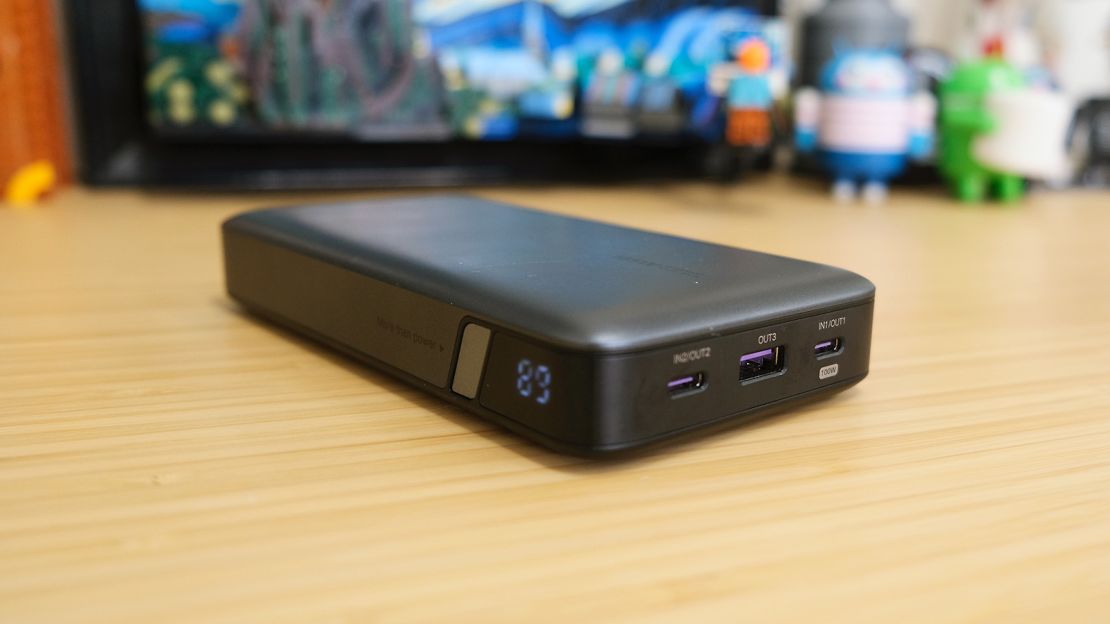
The best portable chargers we tested
Best portable charger for phones: Anker 521
Best portable charger for laptops and tablets: UGreen 145W Power Bank
Best budget portable charger: Iniu Portable Charger
Portable chargers — also known as battery packs or power banks — let us keep our devices charged so we can rely on them when we’re on the go. Offering USB-C ports for the latest devices and USB-A ports for your legacy gear, they can save you from having to hunt down an open outlet at the airport or just keep your smartphone from running out of juice before the end of your workday.
To make sure you’re never low on battery life, we put more than a dozen top chargers through a range of intensive tests, and are regularly checking out the latest models to see what’s actually worth your money. Here are our current top three picks, whether you need something to keep your laptop going all day or just want a cheap and easy way to top your phone up when you’re out.
A compact portable charger with fold-out prongs, the Anker 521 doubles as a USB-C wall adapter. It's highly efficient and totally convenient.
This 25,000mAh pack has the speed to charge everything you can throw at it, including a 100W laptop.
The Iniu Portable Charge is a compact, low-cost 10,000mAh battery pack that will keep your phone, tablet or earbuds going without emptying your wallet.
Best portable charger for phones: Anker 521
$44 From $35 at Amazon

Anker’s 521 Power Bank is a hybrid device. It’s a battery pack, of course, with a 5,000mAh capacity and two USB-C ports on the front of the housing. But on the backside there are two wall prongs that fold out, so you can plug it in and use it as a standard wall adapter to charge your devices as you charge the battery pack itself. On the side of the pack is a single button encircled in LEDs that lets you know how much of a charge the pack has left.
Each of the USB-C ports is capable of outputting 45W of power, but the pack itself is limited to 45W total, so if you have more than one device connected it’ll split the power between the two ports.
The Anker 521 is the most efficient battery pack out of everything we tested, with an efficiency percentage of 86.9% — it’s capable of putting most of the charge it contains into your devices when you need it. When charging the pack through a USB-C port, it took 1 hour and 51 minutes to go from empty to full. But we imagine you’ll use this power bank as a wall adapter when traveling, so it’ll always be charged and ready for use when you leave.
We connected an iPhone 14 Plus, Samsung Galaxy Z Fold 5 and a Microsoft Surface Laptop Studio to the Anker 521 to measure the charging speed for each device. The iPhone 14 Plus charged at 27W, the Z Fold 5 charged at 25W (one of the better speeds out of the packs we tested), and the Laptop Studio hit the full 45W advertised by Anker.
The Anker 521’s combination of versatility, performance and price makes it an easy pick to recommend for those who want to keep their phones, random devices and maybe even a tablet charged while on the go.
Best portable charger for laptops and tablets: UGreen 145W Power Bank
$100 $80 at Amazon

UGreen’s 145W Power Bank is the portable charger you get when you need more power — it’s capable of putting out up to 145W total through its three ports. And it does it for under $100 at time of testing, significantly cheaper than anything else we tested that performed as well at these wattages.
On the front of the pack are two USB-C ports, with a USB-A port between them. The USB-C port on the right is used to charge the pack at 65W or charge a laptop at up to 100W of power. The USB-C port on the far left can also be used to charge the pack or charge a device at up to 45W. The middle USB-A port is capped at 18W.
On the right side of the pack is a small LCD screen that gives you a numerical battery percentage, making it quick and easy to see how much of a charge is left on the pack, along with a power button.
The UGreen 145W has a total capacity of 25,000mAh, and in our drain test used 80.33% of that capacity. That’s above average, especially if you narrow down the test group to larger battery packs like this one, where the average was just under 77%. Charging the pack took exactly 90 minutes when taking advantage of its full 65W charging speed; that’s the quickest charging time out of any battery pack we tested, regardless of capacity.
When connecting it to our test devices and monitoring its output, the results were exactly what we expected. The iPhone 14 Plus charged at 26W, the Z Fold 5 at 22W and a full 96W for the Laptop Studio. (Why don’t any battery packs charge a Samsung device at 45W? It’s a mystery.)
The UGreen 145W Power Bank packs a lot of power into a pack that doesn’t take up a ton of space. It’s efficient, has enough ports for someone on the go, is quickly recharged, and does all of that for a reasonable price.
Best budget portable charger: Iniu Portable Charger
$30 From $18 at Amazon

The Iniu Portable Charger isn’t just easy on the wallet, it’s also small enough that it’ll fit in your pocket or purse without you noticing it. On the front there are three ports, two standard USB and a single USB-C port. There’s also a small bulb that you can trigger and use as a flashlight (you double-press the power button to turn it on — it isn’t super bright, but using it will save your phone’s battery). On top of the pack is a paw print design — press the power button and the paw lights up. It’s fun, if not a bit gimmicky, and it isn’t just decorative: each pad illuminates to show roughly 20% of the total 10,000mAh capacity.
You charge the bank through the USB-C port at up to 15W, which isn’t very fast. In fact, it takes over 3 hours to fully charge the pack, which is probably the biggest downside to it. You won’t charge devices quickly either, as the maximum output is 15W, split up among the ports if you have more than one device plugged in. It’s really designed to handle one device at a time, or to recharge multiple devices at its own pace.
That said, the Iniu Portable Charger had an efficiency percentage score of 85.34%, the third best out of all the packs we tested. It charged the iPhone 14 Plus at 12W, the Z Fold 5 at 11W and the Surface Laptop Studio at 14W. Again, this isn’t a device you get if you want to quickly charge your devices.
But at around $20 and with a 10,000mAh capacity that you’ll get 85% of use out of, it’s a heck of a deal.
How to choose the right portable charger for your needs
Shopping for a portable battery pack comes down to balancing price, capacity and convenience. Speed is also an important consideration, though that comes down to your devices in many cases rather than the battery bank itself.
Consider the type and number of devices you’ll want to charge. If it’s just a single device, such as your phone, then something small and relatively slow — in the 5,000 to 10,000mAh capacity range, capable of charging speeds from 15 to 45 watts — will do just fine. If you want to keep multiple devices charged — a phone and a tablet, or a phone and a laptop — then you’ll want to consider a battery pack with a larger capacity (around 25,000mAh, with speeds of 65 to 100 watts).
That said, don’t get too caught up in the size of the battery. A lot of accessory makers like to state that a battery pack can charge an iPhone or a Galaxy phone a specific number of times. And while the math might check out when you compare the battery size of the phone with the battery pack, not all packs are efficient enough to distribute all of that power down to the last couple of digits. You’ll want to take those numbers with a grain of salt.
Finally, research the charging speed of the device(s) you want to keep charged, and keep that in mind as you start your battery pack search. Many devices use fast-charging schemes, either proprietary solutions or those based on the USB PD (Power Delivery) specification. For instance, the iPhone 14 Plus charges at a maximum speed of 30W, the Samsung Galaxy Z Fold 5 charges at a maximum speed of 45W and the Surface Laptop Studio charges at a maximum of 95W. That said, you shouldn’t have any issues finding a battery pack that can fast-charge your device. Unless you have a Samsung device, that is. In our testing, not a single one of the battery packs was able to charge Samsung phones at their full 45W potential. You’ll want a Samsung charger, or a larger third-party GaN based charger paired with a 100 watt-capable laptop-style USB-C cable.
The number and type of ports on a battery pack are important. But you’ll want to note how the pack distributes power across those ports — often the total output is split up, so you won’t get the maximum speed when charging a single device if you’re using multiple ports. As is the case with USB-C wall chargers, you’re unlikely to find a battery pack that’s able to simultaneously charge all of your devices at max speed.
Consider which charging cables you’re using. Most of the packs have USB-C ports, and maybe a standard USB port for less power-hungry devices. But remember, not all USB-C cables are created equal, and even though the iPhone 15 now uses USB-C, if you haven’t upgraded yet, it’s a good idea to avoid Lighting cables that aren’t MFi certified. With USB-C cables, make sure to double-check that the cable you have or are buying is capable of charging at the speeds you need — not all USB-C cables are capable of charging at 5A/100 W, for instance, so you’ll want to take special care if you’re shopping for a cable to charge your laptop or fast-charging phone.
Also important is the speed of the port that’s used to charge the pack itself, since an empty pack does you no good, and one that’s slow and inconvenient to charge is one you’ll tend to leave empty. Unless you always plan to charge it overnight, you likely don’t want to wait around to fill up a 10,000mAh battery pack at 15W; it’s going to take hours. Our top pick for charging laptops and tablets is a 25,000mAh battery pack that will charge at 65W, which takes exactly 90 minutes.
Look for battery packs that charge via USB-C connectors. Avoid older battery packs that charge using a Micro USB port, which has very limited charging speed. The charging time is going to be way too long.
Can you bring a portable charger on a plane?
Portable chargers are handy during flights — especially if you have a long cross-country or international trip ahead of you — though there are some important things to know before you throw any old power bank in your bag.
According to the TSA battery rules, any lithium-ion battery (including those found in power banks) must be packed in your carry-on baggage and not in any checked luggage, and must carry a watt hour rating of 100 Wh or less. The carry-on restriction allows flight crews to act quickly in the event of a battery overheating and catching fire, as noted by the FAA. Plus, if you’re bringing a portable battery with you on a flight, chances are you’re going to want to actually use it rather than have it stowed away in your suitcase.
Fortunately, many consumer battery packs fall within the TSA’s wattage parameters — including two of our top picks in the Anker 521 and Iniu Portable Charger. However, larger batteries (such as the UGreen 145W model we recommend) require airline approval before being brought onboard, according to the FAA. If you’re unsure whether your power bank of choice (or pretty much any other item you typically throw in your bag) is allowed on board, you can use the TSA’s handy “What Can I Bring?” tool to search for it and get specific guidelines for both carry-on and checked luggage.
How we tested
We ran each and every portable charger through a series of performance tests, measuring capacity, efficiency, speed and more. Because convenience is important, as we assessed portable chargers we looked at design as well as raw performance.
Design
- Size: Battery packs are yet another thing you have to pack and carry around with you. They can be big and bulky and weigh down a backpack. With that in mind, we carefully considered the overall size and weight of each pack in relation to its capacity. We also took into account whether there was a display to show you charging stats or LED lights. Was the power button easy to find and use? What about ease of access to the ports?
- Number of USB ports and output: In addition to total capacity, the number of ports a charger has was the second factor that helped us categorize the adapters. A single USB-C port likely indicates a smaller battery pack and lower capacity, making it better suited for phones, earbuds or even smartwatches. Battery packs with multiple ports are likely bigger in size, capacity and output speed.
- Build quality: We examined the battery packs for any manufacturing defects, materials used and any extra features like a kickstand to hold your phone while it charges or a tiny flashlight that’s powered by the pack itself.
- Warranty period: The warranty period for the portable battery packs ranged from 18 months for Anker’s products up to three years for Iniu’s packs. Everything else on the list comes with a two-year warranty period.
Performance testing
In order to test a portable battery pack, we decided there were three main areas of importance. The first is the capacity of the battery and the efficiency of the pack when drained from a full charge to empty. To get the efficiency of the battery pack, we’d charge it to full and ensure that it indicated it was at 100%. Then we’d connect an AVHzY CT3 Power Meter to the battery pack, set it to a constant power draw of 14W and use a computer connected to the meter to record the results. Each battery would take several hours to fully deplete. We’d then look at the total Wh of energy output by the battery and compare it to the batteries’ stated Wh capacity. The average efficiency of the battery packs was 79.37%. Meaning that if the average battery pack had a capacity of 100Wh, it would output 79.37Wh during our test.
Our top pick for phones, the Anker 521, had an efficiency of nearly 87%, scoring the highest out of all the packs we tested. However, the GoalOneZero Sherpa 100 had our lowest efficiency rating of 65.52%.
After testing each battery pack’s efficiency, we connected it to a 100W charger (none of the packs we tested charged at speeds over 100W) via an AVHzY CT2 meter and used a computer to measure the speed at which the pack charged and the amount of time it took the pack to charge.
Finally, to ensure that the battery packs were capable of fast-charging various devices, we’d connect them to an iPhone 14 Plus, Galaxy Z Fold 5 and Microsoft Laptop Studio and note the charging speed.
We used the following hardware for performance testing.
- An AVHzY CT3 to measure battery pack efficiency.
- An AVHzY CT2 meter to measure charge speed and time.
- We used multiple Mcdodo USB-C to USB-C cables with an LED Display to monitor each port’s output in real time when connected to a device.
- When testing standard USB-A ports, we used the Mcdodo USB-A to USB-C cable with an LED Display to monitor output in real time.
- A Samsung Galaxy Z Fold 5 with a maximum charging speed of up to 45W.
- An iPhone 14 Plus with a maximum charging speed of up to 30W.
- A Microsoft Surface Laptop Studio with a maximum charging speed of up to 95W.
Other portable chargers we tested
Zendure SuperMini 20W
$40 at Amazon
The Zendure SuperMini is compact and cute, but also feels cheaply made and the ridges that mimic a heat exchanger just look weird. There’s a USB-C port on one end and a USB-A port on the other. Its efficiency was the lowest out of the smallest packs we tested. There are better battery packs for the price.
Anker PowerCore III 533
$50 at Anker
The Anker 533 is compact and portable and will easily fit in your back pocket or bag without taking up too much space. The top of it doubles as a wireless charging pad to easily place your phone and charge (though it lacks MagSafe magnetic alignment), but even though the wired charging speeds are slow, the overall efficiency is below our testing average.
Mophie PowerStation Plus
$80 at Apple
If you’re an avid iPhone user who doesn’t want to worry about carrying around a Lighting cable, then the fact that the Mophie PowerStation Plus has a Lightning cable (and USB-C) built into it might be appealing. At $80 for a 10,000mAh pack, it’s pricey, but that’s expected given that it’s an Apple Store exclusive. Its performance was slightly above average when compared to the rest of the batteries we tested, but its charging speeds are limited to 20W.
Otterbox Premium Fast-Charge Power Bank
$55 at Amazon
I wish every portable battery pack I tested looked like the Otterbox Premium Fast-Charge Power Bank. There’s a faux leather material on both sides of the pack. It’s a highly efficient pack, but takes over four hours to fully charge and only has 18W of total output. That’s not very fast.
Belkin BoostCharge 5K
$40 at Belkin
The Belkin BoostCharge 5K is the smallest battery pack we tested, in terms of size and capacity. You could put this in your pocket and it feels like you’re carrying another phone. However, it only outputs 12W, the lowest out of the packs we tested. It’ll charge your iPhone with no problems, but it’s going to take awhile.
Anker 747
$144 at Anker
The Anker 747 could easily be our top pick for phones and tablets, but it’s more expensive than the UGreen and maxes out at 87W max charging speed. It has two USB-C ports, two USB-A ports and comes with a wall charger and cable in the box. If you find it on sale, don’t be afraid to jump on it.
Anker Powerhouse 511
$200 $100 at Anker
The Powerhouse 90 is big and expensive, but it’s also the only portable battery we tested that has a standard wall outlet built into it. You can use it — along with a wall adapter — to charge at speeds of up to 100W. However, it’s far easier to carry around a smaller battery pack and a USB-C cable to get the same performance out of another pack.
Goal Zero Sherpa 100
From $200 at Amazon
I really want to like and recommend this ruggedly built battery pack, but it’s just far too expensive, has the lowest efficiency out of any battery pack we tested and couldn’t charge the Surface Laptop Studio above 45W. We can’t recommend it.
Mophie PowerStation Pro
$130 at Apple
Like the Mophie PowerStation Plus, the Pro is a well-designed battery pack with a cloth cover that wraps around it. It offers a total 45W output, but its efficiency was disappointing and at $130, there are better-performing packs.
Iniu Power Bank BI-B63
$67 at Amazon
The Iniu Power Bank has a total capacity of 25,000mAh, three ports — two USB-C and one standard USB — and a massive screen on the top of its housing. It’s a shame that Iniu didn’t do more to take advantage of the big display, though, as it just shows the battery’s current charge level. It’s the most efficient battery pack we tested, though. It’s an easy choice if you’re shopping for a big battery pack on a budget.














